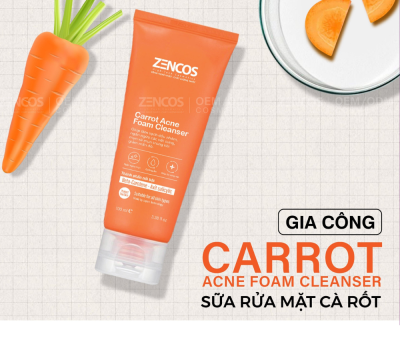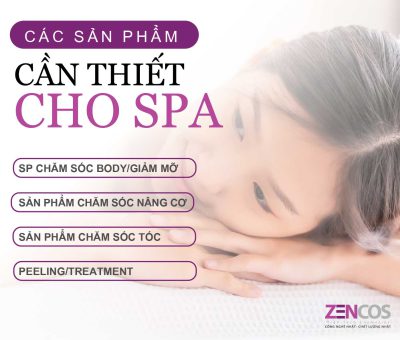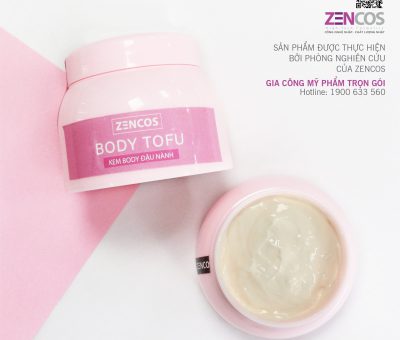What is emulsion? the magical wonder in the beauty industry
For business owners and cosmetics enthusiasts, understanding Emulsion and its application in their product manufacturing process is crucial. Emulsion not only provides a perfect structure but also offers outstanding benefits to products.
In today’s article, let’s delve into what Emulsion is and its applications in the cosmetics industry, with a detailed exploration brought to you by Zencos.
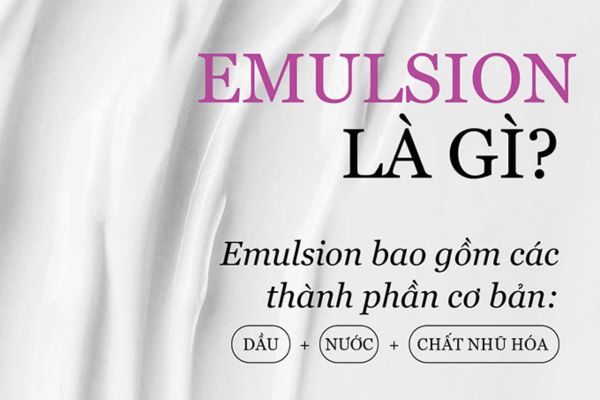
What is Emulsion?
Introducing Emulsion:
Emulsion is a milky-white compound originating from water, which gives it a lightweight structure and a thinner consistency compared to regular moisturizers. This prevents a heavy and greasy feeling on the skin while enabling the skin to absorb nutrients quickly and effectively.
II. Components of Emulsion:
Emulsion consists of basic ingredients such as oil, water, and emulsifiers, which play crucial roles in creating a stable Emulsion structure.
-
Oil: Being insoluble in water, oil typically has emollient properties and provides moisture and nutrients to the skin. Additionally, it acts as a protective barrier against moisture loss and environmental influences.
-
Water: Water provides moisture, soothes the skin, and aids in dissolving and evenly distributing other ingredients. It also enhances the purity and breathability of the Emulsion.
-
Emulsifiers: Serving as intermediaries between oil and water, emulsifiers help establish a stable structure in Emulsion. They have the ability to absorb and hold oil droplets within water, forming a stable dispersed system. Emulsifiers also regulate the viscosity of Emulsion.
The components within Emulsion work together to create a stable structure and provide unique properties to the product.
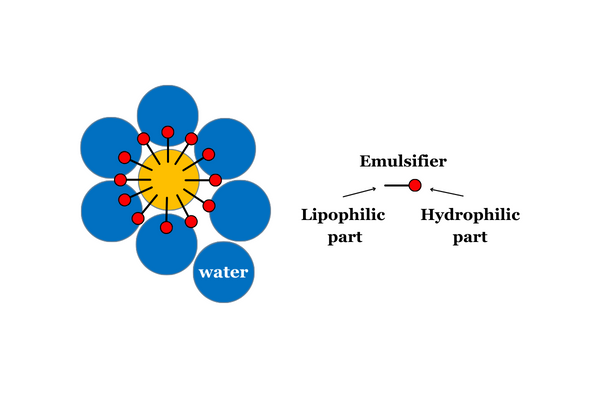
What are the ingredients of Emulsion?
Different Types of Emulsions:
Water-Based Emulsion:
- Mixing ratio of a small amount of oil and a larger amount of water.
- Primary structure: Oil droplets dispersed in a water-based environment.
- Applications: Commonly used in lightweight moisturizers with fast skin absorption.
Oil-Based Emulsion:
- Mixing ratio with a larger amount of oil and a smaller amount of water.
- Primary structure: Water droplets dispersed in an oil-based environment.
- Applications: Suitable for dry and protective skincare, such as barrier repair creams.
Silicone-Based Emulsion:
- Mixing ratio of water and silicone.
- Primary structure: Water-based environment dispersed by silicone particles.
- Applications: Often used in hand creams and skincare products with protective and skin softening properties.
Combined Emulsion:
- Mixing ratio of water, oil, and water.
- Primary structure: Water-based environment surrounded by two layers of oil.
- Applications: Commonly used in moisturizing and deeply hydrating skincare products.
Oil-Free Emulsion:
- Mainly composed of solutions and gels.
- Primary structure: Contains no oil and has a lightweight texture.
- Applications: Suitable for sensitive and oily skin, does not clog pores.
Water-Free Emulsion:
- Suitable for skin with a disrupted skin barrier.
- Primary structure: Contains no water, often uses emollients and binding agents to create a stable environment for the skin.
Thanks to the scientific properties of each type of emulsion, water-based emulsion is the most common in skincare formulas. With low production costs and effective skin absorption, water-based emulsions are a typical application of emulsions.
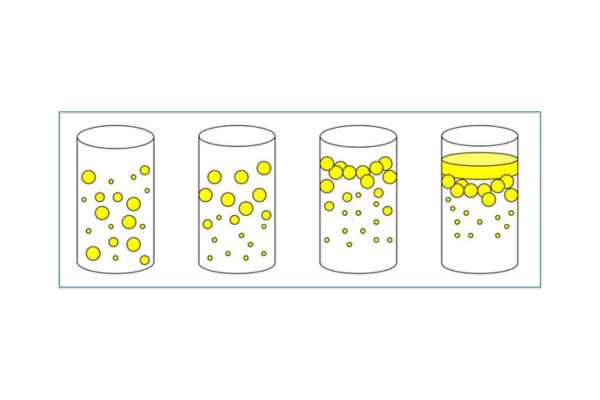
The Applications of Emulsion:
In skincare, the size of molecules plays a crucial role in determining a product’s absorption into the skin. Specifically, water molecules are smaller than oil molecules, which means products containing water-based ingredients have better skin absorption.
Conversely, products with oil-based ingredients have a lower absorption rate of nutrients into the skin. This explains why emulsion exists—to ensure that nutrients can penetrate deeper layers of the skin.
However, emulsion is not merely a combination of water and oil. It also provides essential oils and nutrients needed to maintain the balance between water and oil on the skin. What’s unique about emulsion is its enhanced absorption compared to regular moisturizers. It also minimizes the risk of causing acne and pore blockage.
The function of Emulsion is designed to act as a moisture-locking layer. It keeps nutrients from the previous steps, such as essence and serum, in place. When applied to the skin, emulsion interacts with the natural oils on the skin’s surface and promotes the moisturizing process, helping to maintain the skin’s moisture and prevent the evaporation of other products.
Additionally, emulsion can be used as a substitute for makeup primer. This provides the necessary moisture for the skin, controls oil production, and limits the contact of cosmetic chemicals with the skin.
Although emulsion serves a similar purpose to gel-type moisturizers, it should not be a direct replacement for a makeup primer. This is because moisturizers have a denser texture and a longer-lasting effect. Using emulsion as a makeup primer may lead to pore congestion and stimulate excess oil production.
With its excellent absorption capability, moisturizing properties, and the balance it maintains between water and oil, emulsion is an effective choice for skincare. It helps maintain skin moisture while limiting oily conditions and pore blockage, resulting in softer, fresher skin.
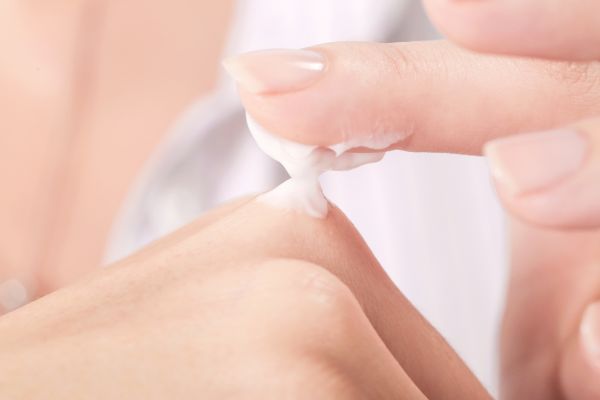
What are the Effects of Emulsion?
Emulsion is a versatile skincare product that offers various benefits:
For Oily and Acne-Prone Skin: Emulsion is an excellent choice for individuals with oily and acne-prone skin, thanks to its water-based formula. It helps control excess oil and provides hydration without causing a product buildup on the skin. It helps balance the skin.
For Dry Skin: Emulsion can enhance moisture levels for dry skin without leaving a heavy or greasy feeling, restoring balance.
However, not all emulsions offer the same benefits for all skin types. It is important to combine emulsion with other skincare components like hyaluronic acid for added hydration or ceramides to strengthen the skin’s protective barrier. Therefore, before selecting a product for manufacturing, it’s essential to consult with Zencos specialists to ensure that the product aligns with your goals and your target audience’s needs.
Conclusion:
In the world of skincare, emulsion has become an important and effective tool for maintaining moisture and providing nourishment to the skin. With its lightweight texture and excellent absorption capabilities, emulsion helps balance skin moisture without causing stickiness or pore congestion.
Emulsion is particularly suited for those with oily, acne-prone skin and individuals with dry skin in need of enhanced hydration.
To gain a better understanding of emulsion’s benefits and maximize its potential, Zencos is prepared to assist you in creating high-quality skincare products. These products feature exclusive formulas and meet production standards.
Join Zencos in creating skincare products that reflect your brand’s identity and establish a competitive edge in the market.

